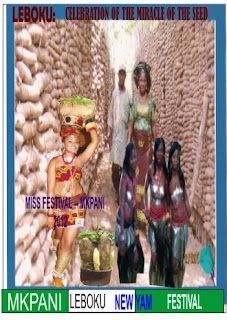CONSTITUTION REVIEW AND THE IMPERATIVES FOR CREATING A ROLE FOR TRADITIONAL RULERS
CONSTITUTION REVIEW AND THE IMPERATIVES FOR CREATING A ROLE FOR TRADITIONAL RULERS
By H.R.H Obol Sunday Obono Okoi
(Obol Lopon of Mkpani)
Yakurr Local Government Area,
Cross River State.
On the 2012, review of the 1999 Constitution
of the Federal Republic of Nigeria.
Irrespective of the reservations by some people on giving traditional rulers constitutional roles, the need has become imperative in view of their contributions in maintenance of peace and creating cordial synergy among their people
The inclusion of traditional rulers into the constitution will address the distortion created by the isolation of the traditional institution in the country’s democracy.
The traditional institution remains the oldest surviving politico-cultural institution which has always served as the pivot for social security, national cohesion and meaningful socio-cultural development. Their role should be such that are advisory in such ways that are the performance and conduct of traditional rulers do not conflict with the interest of peaceful co-existence and good governance.
Traditional rulers, apart from their potential for being the law makers even at residual (L.G.A) levels as eligible dynasts, they can play useful roles in brokering peace and unity between the people and the state, enhancing national identity, resolving minor and major conflicts and providing an institutional safety-valve for often inadequate state bureaucracies.
To be sincere, the phenomenal growth in crimes and corruption suggests a new dimension that is pathological and demanding a different postulation in terms of etymology and sociology of crime. The kidnapping, oil bunkering, militancy and propitious violence of the Boko Haram clearly suggest that new approaches are requires to contain in their challenges.
Therefore, containing the scourge of the security challenges requires intelligence gathering at the grass roots, and this is where nobody in Nigeria is better positioned to track locals who do crime than the traditional rulers. We need to reverse the pattern of security from top-bottom to bottom-top approach, where intelligence gathering, peace and amity building starts from the grass roots where the traditional rulers and traditional institutions will play a critical role.
The on-going constitutional review by the National Assembly should also consider giving the traditional rulers a direct power to anchor Alternative Dispute Resolution (ADR). This includes dispute resolution processes and techniques that act as a means for disagreeing parties to come to an agreement short of litigation.
Traditional rulers can also be used to achieve restorative justice in Nigeria. Restorative justice (also sometimes called (“reparative justice”) is an approach to justice that focuses on the needs of the victims and offenders, as well as the involved community, instead of satisfying abstract legal principles or punishing the offender.
It is crystal clear that the traditional rulers and traditional institutions are grossly under-utilized in Nigeria. It is also clear that the areas where the traditional rulers are most suited to make a difference in nation building are mostly in alternative dispute resolution, restorative justice and intelligence gathering etc. Though, they may be said to be engaged in some of this already, it is still at rudimentary level and out now to be constitutionally assigned defined and funded.
The proposed idea is to tap into the large reservoir of human resources lying almost fallow at the traditional institutions. Since the traditional rulers are the ones at the grass root, positively engaging them is a straight way to bring government to the people and a transition to a more peaceful and meaningful life in Nigeria. The idea that they should be shielded from politics is warped and an unnecessary imitation of western models. Given that, mandate for leadership is traditionally conferred on the traditional rulers through native laws and customs, and across the broad spectrum of the community, it is expected that traditional rulers are impartial arbiters in matters of politics and social development. Any role so granted by the constitution must therefore, of necessity insulate them from partisan politics.
Without prejudice to their fundamental rights to vote in an election, manifest sympathy for political party against another must be prohibited.
Above all, the proposed granting of constitutional roles to traditional rulers must take cognizance of the fact of the various indigenous traditional norms, without prejudice to individual citizen’s right to life, fair hearing, freedom of conscience and religion, as enshrined in the constitution of the Federal Republic of Nigeria.




Comments
Post a Comment